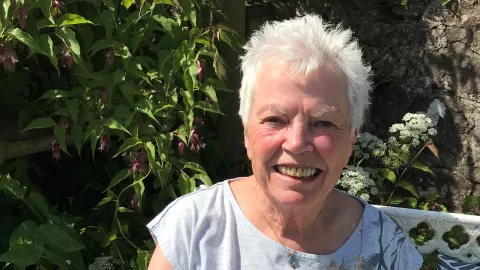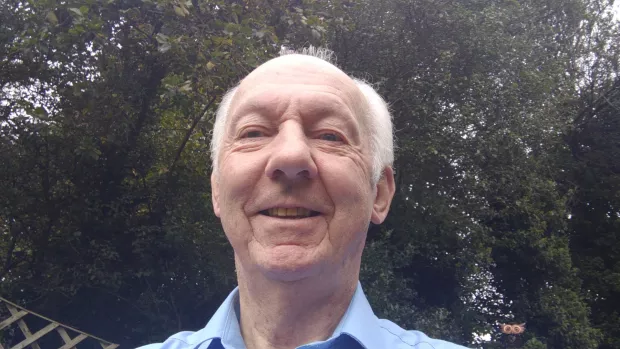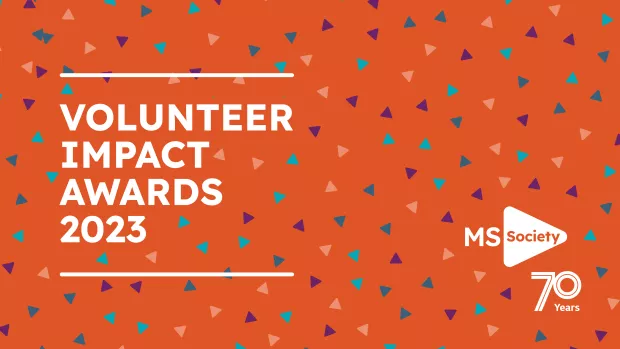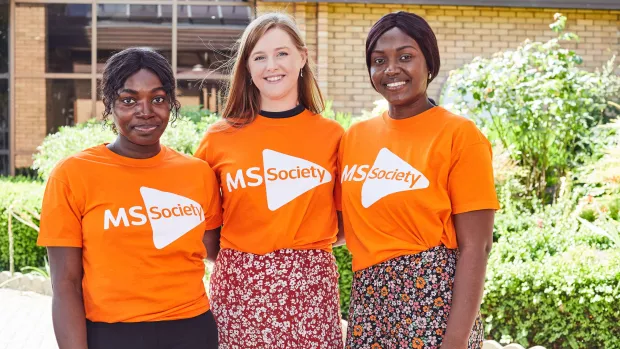
Volunteering has made me a more rounded person
Judy is Group Coordinator of our Borders Group. She tells us how they benefit from a supportive local community. And how campaigning can really make things happen.
My connection with MS began in 1996. I took a job at a respite centre called Leuchie House in North Berwick, run then by the MS Society. Although I had a nursing background, I didn’t know a huge amount about MS, so it was very challenging to start with. I was bit terrified, but I learnt a lot.
I became interested in volunteering because people staying at Leuchie House were often transported there by volunteers. I was so impressed by how they gave up their time. So, once I’d retired, and we’d moved from Edinburgh to the Borders area, I joined the Borders Group in 2003. I coordinated the therapies the group offered, and became Vice-Chair and then Secretary.
Local generosity
I finally became Group Coordinator in 2020, just before the first COVID lockdown. Although we had to stop most of our fundraising activities, we were very fortunate that people kept donating to us. We didn’t ask for money — they just sent it to us. I couldn’t believe it!
People in the Borders are really supportive. They know who we are and what we spend our money on. We benefit from a horse racing club started some years ago by a lady with MS. She wanted to give something back in return for all the support she’d received from the Borders Group when she was diagnosed. The syndicate is fantastic for fundraising, and going to the races has been a lot of fun.
The MS Society also receives a percentage from the sales of a special MS gin created in a local distillery. They held a fabulous fundraising gin tasting session online during lockdown.
Supporting our community
The group runs events throughout the year, such as information evenings. And the recent research evening, when someone came to talk about the new Octopus drug trial. Living in such a rural area, people enjoy the chance to get together. And we always seem to get a few we haven’t met before, which is an opportunity to tell them what the group can offer. The highlight of the year is the Christmas dinner. Over 70 people attended the last one, which is pretty good.
Services-wise, we fund therapies such as physiotherapy and Pilates, and give grants. Before lockdown, we offered hydrotherapy for people with MS, using the pool at Borders General Hospital. But this is now closed for repairs. In the meantime there are a couple of new pools being built, which could be a possibility for us. Wherever we go, it’ll be expensive, so I’m looking at applying for some grant funding. Hydrotherapy is one of the most impactful services we’ve offered, so we want to open it up to as many people as possible.
Helping as many as we can
We do get quite a few people from outside our official area asking for support, or to access our services, and that’s fine. We’re here to support people affected by MS. So, if there’s not an MS Society group in their area, we’ll help them.
One group which used to be more difficult to support was young people. This changed when I suggested having an evening just for young people at a local hotel, led by one of our younger volunteers. It was very successful, and now they get together for nights out and do their own fundraising events, such as skydiving. And, most importantly, they get continuous peer support from each other on social media. If a young person contacts the group, we now have something definite to offer them.
Make a bit of noise
One of the group’s greatest achievements across the years has been in campaigning. It was our campaign and petition back in 2003 that helped bring the first MS nurse to the Borders area. And we’ve campaigned ever since to ensure the role stays filled. This happened again quite recently, when we wrote to the Chief Executive of NHS Borders to ask why the post hadn’t been re-advertised. We copied the letter to all the MPs and MSPs, which worked a treat.
The post is only part-time now, and the new nurse is still training to be an MS specialist, but she’ll be starting very soon. We’re all really thrilled with this result. If we hadn’t done anything, they would’ve just left it. But if you make a bit of noise, then they can’t.
Another important campaign of ours is against people losing care packages if they’re in hospital for more than two weeks. And we’re also pushing for the creation of a venue where people with MS can use specialist off-road wheelchairs to enjoy some freedom in the countryside.
Qualities for success
I think a Group Coordinator needs good organisational skills and the ability to motivate others. And it’s important to stop now and again to look at where people’s skills and interests really lie. There’s no point asking other volunteers to do things they don’t enjoy, because they won’t put their hearts into it. You also need to have empathy (rather than sympathy) for people with MS, and think about practical solutions for them if you can.
Of course, there are always challenges. We sometimes walk a tightrope between what people would like us to do to help them, and what’s appropriate or realistic. We don’t want to overstretch ourselves. So, I have to find a pleasant way of saying ‘No’.
It’s a two-way thing
Volunteering has made me a more rounded person. It’s increased my awareness of the challenges that people with disabilities face, and enabled me to make a difference to people’s lives. And every volunteer can make a difference. Everyone has their own expertise. It might be organising a petition, or visiting someone with MS for a chat, or baking for a fundraiser. Every contribution, big or small, is valuable.
And it’s a two-way thing. Volunteers meet like-minded people and become part of a community. It gives you a focus. I always say that, once you put on the orange MS Society t-shirt, you’re here for life!



